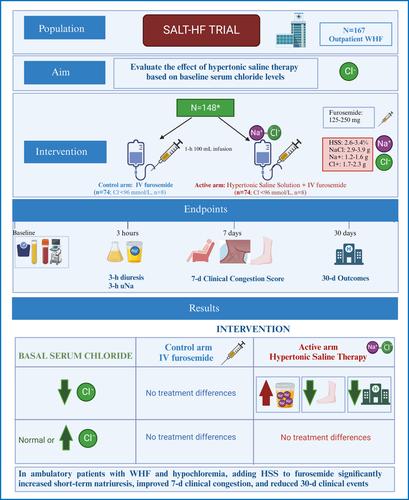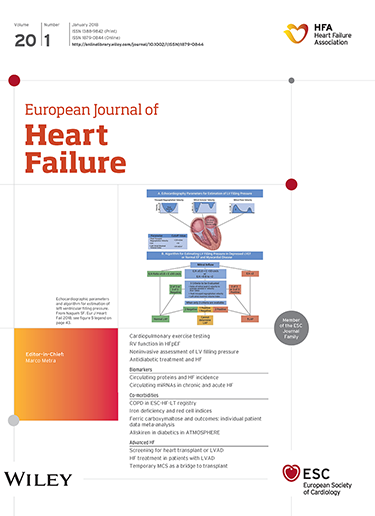Salt repletion and diuretic response: The role of serum chloride. A post‐hoc analysis of the SALT‐HF trial on furosemide and hypertonic saline solution administration in ambulatory patients with worsening heart failure
IF 16.9
1区 医学
Q1 CARDIAC & CARDIOVASCULAR SYSTEMS
引用次数: 0
Abstract
AimsThe efficacy of combining hypertonic saline solution (HSS) with loop diuretics in worsening heart failure (WHF) remains uncertain. Hypochloraemia has been associated with reduced diuretic efficacy. Some authors propose that chloride repletion may enhance natriuretic and diuretic responses. This post‐hoc analysis of the SALT‐HF trial evaluated the effect of single‐dose administration of HSS plus intravenous (IV) furosemide versus IV furosemide, stratified by baseline serum chloride.Methods and resultsThe analysis included 148 ambulatory patients with WHF from the double‐blind, randomized SALT‐HF trial. Participants received either an IV single dose of HSS plus furosemide or IV furosemide. The endpoints were 3‐h urinary sodium excretion and diuresis, 7‐day congestion score, and 30‐day adverse events according to chloride levels. Multivariable linear and logistic regression models assessed the relationship between the intervention and the endpoints. The mean baseline serum chloride level was 100 ± 4 mmol/L. Sixteen patients (10.8%) were identified as hypochloraemic (serum chloride <96 mmol/L), balanced between treatment groups. Patients with hypochloraemia showed a lower natriuretic response (

盐补充与利尿反应:血清氯化物的作用。对急性心力衰竭患者给予速尿和高渗盐水的SALT - HF试验的事后分析
目的:高渗生理盐水(HSS)联合利尿剂治疗心力衰竭(WHF)恶化的疗效尚不确定。低氯血症与利尿效果降低有关。一些作者提出氯离子的补充可能会增强利钠和利尿反应。这项对SALT - HF试验的事后分析评估了单剂量HSS加静脉注射(IV)呋塞米与静脉注射呋塞米的效果,并按基线血清氯化物分层。方法和结果本研究纳入了148例来自SALT - HF双盲随机试验的流动WHF患者。参与者接受静脉注射单剂量HSS加速尿或静脉注射速尿。终点是3小时尿钠排泄和利尿、7天充血评分和30天根据氯化物水平发生的不良事件。多变量线性和逻辑回归模型评估了干预措施与终点之间的关系。平均基线血清氯化物水平为100±4 mmol/L。16例(10.8%)患者被诊断为低氯血症(血清氯化物& 96 mmol/L),治疗组间平衡。低氯血症患者的利钠反应较低(p <;0.05)。相互作用分析显示,基于氯化物水平的不同处理之间的差异利钠效应(相互作用= 0.008)。与低氯化物水平的速尿相比,HSS加速尿增加了尿钠。3小时利尿没有发现两种治疗效果的差异。在7天的临床充血评分和30天的心力衰竭事件中也发现了类似的异质性结果,HSS对氯浓度较低的患者有好处。结论在非卧床WHF合并次氯血症患者中,在速尿中加入HSS可改善短期利钠反应和预后。这些发现表明,氯补充剂可能有助于克服这些患者的利尿剂耐药性。
本文章由计算机程序翻译,如有差异,请以英文原文为准。
求助全文
约1分钟内获得全文
求助全文
来源期刊

European Journal of Heart Failure
医学-心血管系统
CiteScore
27.30
自引率
11.50%
发文量
365
审稿时长
1 months
期刊介绍:
European Journal of Heart Failure is an international journal dedicated to advancing knowledge in the field of heart failure management. The journal publishes reviews and editorials aimed at improving understanding, prevention, investigation, and treatment of heart failure. It covers various disciplines such as molecular and cellular biology, pathology, physiology, electrophysiology, pharmacology, clinical sciences, social sciences, and population sciences. The journal welcomes submissions of manuscripts on basic, clinical, and population sciences, as well as original contributions on nursing, care of the elderly, primary care, health economics, and other related specialist fields. It is published monthly and has a readership that includes cardiologists, emergency room physicians, intensivists, internists, general physicians, cardiac nurses, diabetologists, epidemiologists, basic scientists focusing on cardiovascular research, and those working in rehabilitation. The journal is abstracted and indexed in various databases such as Academic Search, Embase, MEDLINE/PubMed, and Science Citation Index.
 求助内容:
求助内容: 应助结果提醒方式:
应助结果提醒方式:


